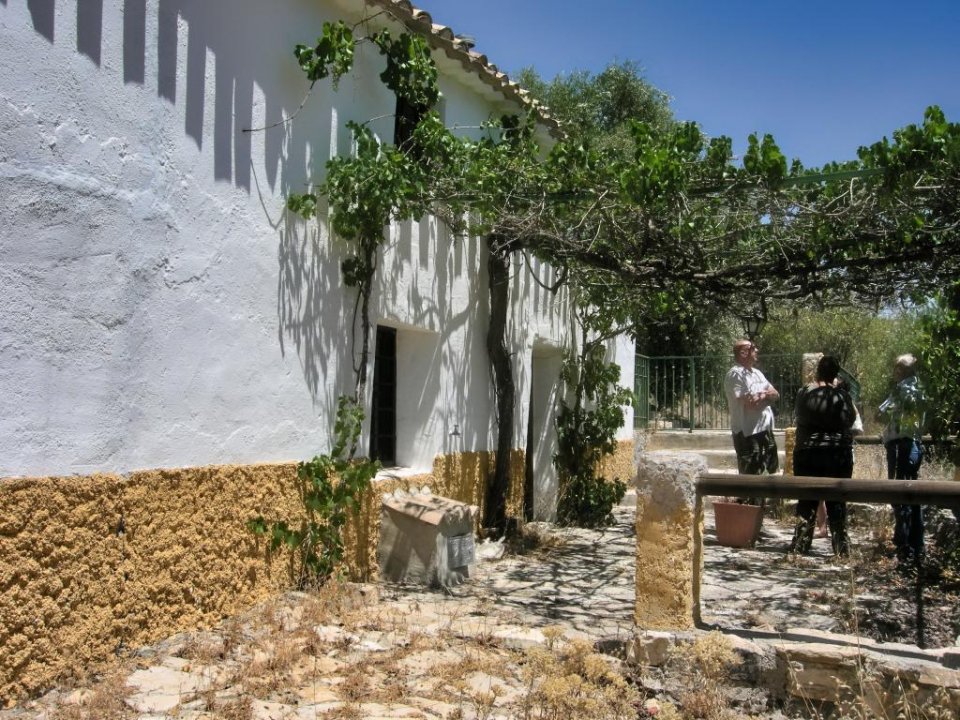To launch our new Books section on Spain in English, we’re publishing an extract from a new book by Sabina Ostrowska, who lives in the middle of olive groves outside the picturesque village of Montefrio in rural Andalusia, and who runs a language school in the town of Alcalá la Real. Her memoir The Crinkle Crankle Wall: Our First Year in Andalusia aims to be the first in a series depicting her and her husband’s adventures of trying to start a new life in the south of Spain.
Our new section will regularly review and report on books about Spain, set in Spain, or with a touch and taste of Spain – from fiction to non-fiction, historical to comical – plus news on literary festivals and awards in Spain. If you’d like to recommend or review a book related to Spain, please email: editorial@spainenglish.com
In Search of a Rural Paradise
After a few weeks of searching for our dream home, I got tired and weary and started convincing myself that I could live in whatever dump the real-estate agent was showing us at the moment. Every evening during the house hunt, Robert and I sat down, drank wine, and crossed off more items from our dream specifications.
‘Well, maybe we don’t need to grow vegetables,’ I would suggest.
‘These dogs can’t be that noisy at night, I’m sure,’ Robert would delude himself.
‘I don’t think that river ever overflows,’ I would state an obvious lie.
‘Do we really need a fireplace? It’s hot in Spain.’
‘Maybe we won’t hear the highway on the other side of the house.’
‘Who needs two bedrooms? It’s just the two of us.’
We went on cutting things out and making compromises, until one day we found ourselves standing in a one-bedroom apartment located between the parking lot of a Carrefour supermarket and the Granada-Cordoba motorway. We were confronted with a collection of empty bottles of cheap whiskey and at least ten cats rubbing themselves against the drunk owner’s blotchy varicose legs, and the real-estate agent’s freshly pressed power suit.
Whilst ruins tend to trigger your imagination and make you believe the impossible, a depressing apartment inhabited by a widowed alcoholic makes you worry that you are catching a glimpse of your own future; a parallel universe in which you made only bad choices.
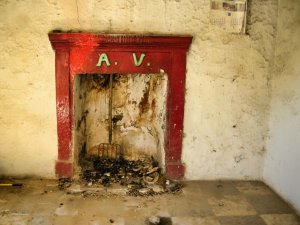
During our house hunt, we saw a good number of places inhabited by lonely old men. As we entered one cottage, the owner and his brother were positioned at a filthy kitchen table drinking homemade red wine. Their lips purple from the day’s intake. The facial marking reminded me of my high-school French teacher who smoked so much that part of his moustache was permanently discoloured. Unlike the rest of his hair and moustache which were jet-black, the spot where he held his cigarette was the colour of wet hay and mud. Many other teachers at my school had the inevitable orangey-brown spots on their index and middle fingers and tawny front teeth. They used these body markings to warn us against smoking, and it did curb our appetite for nicotine a little bit, but not for long.
Observing the two drunken brothers, it became clear to me that if you drink a lot of cheap red wine, your lips can become permanently discoloured, similar to a gentle uneven application of lipstick. These two macho men seemed somewhat incongruous wearing surreptitious make-up.
Most of the kitchen space was taken up by a large dining room table and a TV set. It’s a set-up that I have seen in many country homes inhabited by older people in Andalusia. Usually, there is an imposing dining table in the middle of a small kitchen. By the table, you will find sofas and armchairs facing a TV set that is often hidden inside a locked cabinet. The lifestyle suggested by this furniture arrangement is very obvious and one that, I have to admit, is particularly appealing to me. As I watched the brothers comfortably lounging on their sofa in the kitchen, watching TV, and guzzling glasses of red wine, I could easily see myself enjoying this very same lifestyle. This, of course, raised internal concerns about my future.
‘Is this going to be me in 20 years?’ I wondered. ‘Is this how I will spend my last decades on earth?’
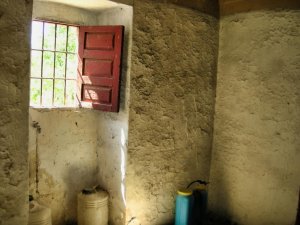
What was appealing about the whole set-up was that you could not call the two men ‘couch potatoes’ because they were sitting at the dinner table. The simple act of placing the couch in front of a proper table made the whole tableau more acceptable. I could not compare this pair of free-livers to slobs who spend all day watching telly on the sofa with an ashtray on the sofa’s arm and an assortment of empty beer tins on the floor.
These guys had their paraphernalia neatly arranged on a rustic wooden table; the wine came from a massive jug and a giant leg of jamon that rested on the counter ensured that they were fed protein and fat at regular intervals. All this made me like and even admire the inebriated house owner. Even though we could not envisage ourselves living in his house, we obediently followed him around the different rooms and outbuildings and acted as prospective buyers.
In retrospect, the tour of his cortijo was precious because it was the first time during our search that we actually got to see a real, functioning Andalusian cottage and come to appreciate the lifestyle of a seasonal olive picker. Our latest agent, a tiny Basque girl called Amaya, explained that there was no work for the old men in the summer because the olive season starts in late October.
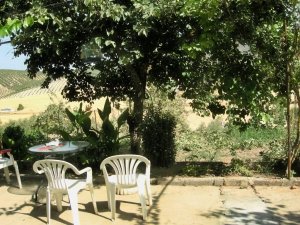
I struggle to classify him as a farmer. He did have some chickens living in the same enclosure as his guard dog, and he had prepared a small vegetable patch at the back of the house which was protected by a minuscule pug that barked at us throughout our visit. But these arrangements were just for his own use and pleasure.
The house etched itself in my memory because of the overwhelming sense of sadness that it left me with. In stark contrast to the kitchen that was inhabited almost permanently by the two brothers and their jugs of red wine, the living room was in pristine condition. There was a traditional Andalusian cabinet displaying decorative plates and framed photos of the family. Some of the photos were black and white and showed doe-eyed brides and bewildered grooms. Others were from more recent decades and showed big-headed babies and stiffly posed relatives in their Sunday best. Under each photo, there was an embroidered serviette which indicated that someone had once loved and cared for this place.
It was clearly the formal dining room. The big table was covered with white linen with crochet borders. Fading red plastic flowers constituted the centrepiece. Gaudy religious ornaments on the shelves and an assortment of Virgin Marys in pink and blue tones decorated the walls. They brought about a sense of sacred sadness to any visitor. This formal dining room was a place of solemn remembrance of times past and not a place for joyous family festivities. A wooden cross hung over the doorway with an accurately impaled Jesus who was clearly uncomfortable holding two miniature bouquets of plastic flowers in his arms.
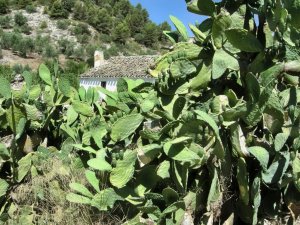
Had better days suffused this room with joy and happiness? I imagined, the first communion of a loved child with family members gathering from far and wide with expensive gifts paid for by their hard-earned money: a gold necklace, a pair of silver earrings, a leather-bound prayer book? A little girl in a puffed meringue dress proudly sitting at the head of the table with her gifts generously displayed in front of her. Her uncles and aunts drinking coffee and eating cream cakes, and surreptitiously comparing the gifts each had brought for the occasion. Or perhaps an Easter celebration — Semana Santa with the pair of living room doors flung open to the garden to let in the spring air, providing the visitors with a glimpse of bearded irises in full bloom next to a rusty chicken-feed bucket. The competing odours of fried roscos, sugar-coated festive doughnuts, and croquetas de bacalao, cod croquettes, would drift tantalisingly from the kitchen, causing the visiting family members to cast furtive eyes to the stove in anticipation of long-awaited sustenance.
Another time, we may find a small group of burly men sitting and drinking their cervezas and snacking on salchicha, or dried sausage, and bread, while the women fuss around and don’t dare to sit down until all the food is ready. I hope that these were the happy days for this house, but I did not want this living room. It was brimming with memories and ghosts that were not mine.
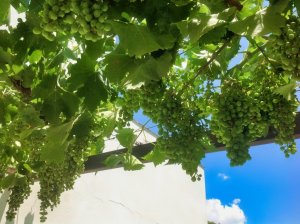
As one of the old men showed us upstairs, the empty despair of his life became even more evident. Upstairs there were three little bedrooms with no signs of life. It looked as if the owners of these rooms just left them in a hurry; their books and some personal belongings still neatly arranged on the shelves, but clearly untouched for decades.
Adjacent to these rooms was a cold store where traditionally one would cure giant legs of jamon, store meats, and other preserves made in the summer. The ham and other cold meats would be hung on hooks from the ceiling and drip fat slowly for several months, permeating the polished concrete floor with indelible splatters of grease. The room, which is a feature of any genuine cortijo, was so cleverly built and positioned that it stayed cool even throughout the hottest summers. Amaya suggested that it would make a great master bedroom. She said that we could connect it with one of the adjacent bedrooms and make it into an en suite. I turned around not to look at her and rolled my eyes.
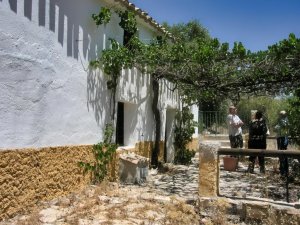
‘Honestly!’ I thought. I could see myself lying in bed in my cold store bedroom and staring for hours at the empty ceiling, expecting to see the spectre of jamons past, hanging from the rusty hooks. I might as well buy an abandoned abattoir and try to make it into a cosy home. We followed the owner downstairs to have a look at the patio and the outbuildings. Since I had not seen a recently occupied bedroom, I assumed that there was another room adjoining the kitchen where the owner usually slept.
‘Or did he just slumber on the sofa in the kitchen?’ I wondered, but I did not ask. The outdoor patio revealed the incredible vitality of Andalusian nature. Despite the despair and anguish that shrouded this semi-abandoned abode, the outdoors revealed life and cheerfulness. The doorframe was guarded by pots of lively red geraniums, and the patio was surrounded by a fantastic array of gladiolas, hollyhocks, and dahlias. Stunning roses framed the picturesque view of the olive hills and a brilliant pink bougainvillaea climbed from the base of a white wall. Massive green and red grapes were hanging over our heads, creating a secret garden. This was a slice of paradise.
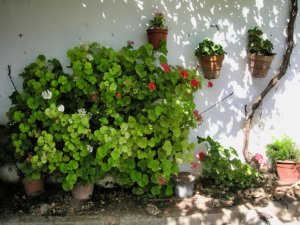
I looked at a piece of paper that contained the details of the listing and noticed that it mentioned a swimming pool. I asked the estate agent about it and she directed my sight to a cylindrical concrete water tank flanking the house. It was placed there to collect the rainwater throughout the winter. I decided to give the ‘swimming pool’ a closer look, even though I started to question her mental abilities. As I stood next to this two-metre-tall rainwater tank, I wondered how on earth would anyone ever get in and out of it. Another nagging issue was the notion of swimming in the same water that you would wash your dishes with. These two activities could not be reconciled.
‘Well, let’s see,’ I thought as the owner brought out an old wobbly ladder so that we could inspect the content of the rainwater tank. I clambered up to take a peek and saw a thick layer of green sludge encrusted with moths, mosquito eggs, and dead wasps. It was a cesspit in the making. Seeing my befuddled expression, Amaya explained that it was an Andalusian custom to jump into such water reservoirs to cool off on hot August days. How she got from the monstrosity that confronted us to call it a swimming pool was beyond my imagination.
Seeing my disbelief, she started to suggest sites around the property where a proper swimming pool could be built. With the owner optimistically chipping in with ideas, we passed another half an hour making plans and modifications for a house we did not want to buy in the first place.
You might think that it was all a waste of time, but looking at homes that you don’t want to buy and discussing how you would fix them is part and parcel of spending time with an estate agent and viewing properties. And the estate agent is usually quite aware of this. It gets you warmed up and ready for the real deal.
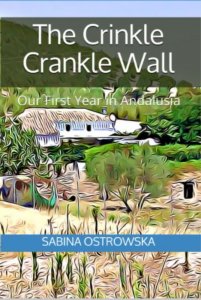
The Crinkle Crankle Wall is available for Kindle and as paperback on Amazon UK, Spain and USA. For updates on other books in the Andalusian series and free samples, you can follow Sabina’s blog at: www.sabinaostrowska.com or on Facebook and Instagram.

